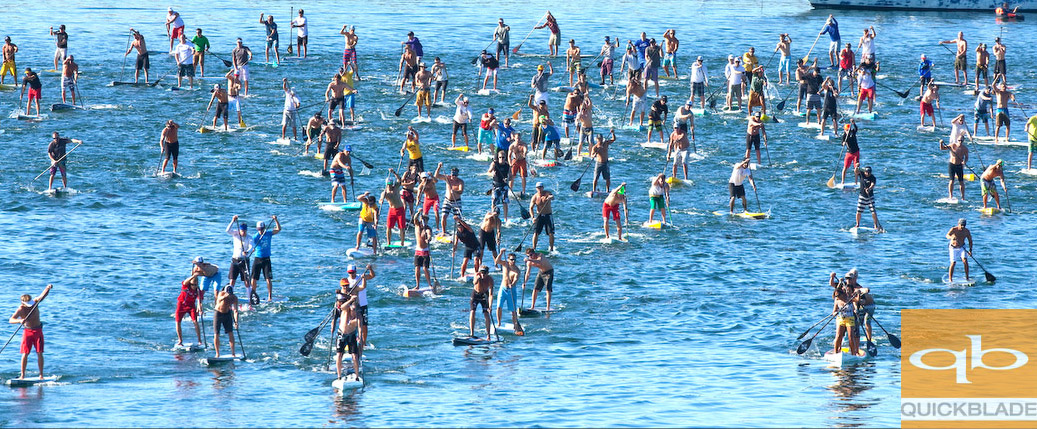
[PART 2] Dave Kalama On The Prize Money Debate: “Whoever Has The Gold Makes The Rules”
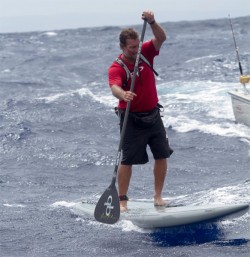 Boss Man’s note: This is Dave Kalama’s in-depth follow up to his recent guest post tackling the equal prize money debate.
Boss Man’s note: This is Dave Kalama’s in-depth follow up to his recent guest post tackling the equal prize money debate.
There’s been a lot of chatter about how the prize purses at major SUP races should be split but, as far as Kalama is concerned, most of the debate has missed the point. Read the entire guest post below but the main two points Dave is making seem to be: 1) The prize money split should be based on the desires of the sponsor or whoever is putting up the money, and 2) we should stop and get some perspective on this whole debate, because it’s not actually as important as it’s being made out out be…
There are some wise words in there and plus, as one of the guys who practically invented modern Stand Up Paddling, I think we should all pause and listen to whatever Dave has to say about our sport regardless of whether you agree or disagree…
*****
Thoughts On Prize Money In Stand Up Paddling by Dave Kalama
A couple of weeks ago I posted some thoughts on the “prize money debate” that’s flared up recently. My comments then centered around how I believe that prize money should be split based on level of competition more than anything. While I still think that’s true to some degree, I’ve been thinking more about it since then and believe we need to take a slightly different and much broader look at this topic, which I’ll get to in a moment.
However firstly I think what we REALLY need is to get some perspective on the prize money debate, because I don’t think this is as big of an issue as it’s being made out to be…
Right now there’s really only about 20 people who are involved in this whole prize money debate, because it’s generally the same 20 people that are winning prize money at any major race. So in that respect, this issue is not going to effect 99% of participants in SUP races. I appreciate that getting this right will set a precedence for generations to come, but really, right now there are only 20 people, plus a few event promoters, who need to sort this out. In that regard it’s very minor and probably doesn’t deserve as much attention as it gets.
I think the reason this debate does garner so much attention is that people want to turn it into a battle of the sexes. And sure you can spin it that way if you want, but for me it’s never been about men vs.
women… I’ll expand on that point in a moment, but firstly I think we really have to hammer home the fact that we’re only talking about TWENTY people here… out of THOUSANDS of paddlers.
That doesn’t meant it doesn’t warrant finding a solution, that’s not what I’m suggesting at all, it just means we need to put it into perspective. And I do appreciate that for those 20 people this is vitally important, because those athletes are looking to build and/or protect their income.
But yeah, the first point I’m trying to make is that we need some PERSPECTIVE on this whole debate.
The second point is that this isn’t really up to the paddlers anyway, or at least I don’t think it should be…
At the risk of being too cynical I feel this whole issue comes down to one thing: What the person with the money wants to get out of an event.
What I mean by that is if a major sponsor is putting up the prize money at a big SUP race, then THEY are the ones who should dictate where that prize money goes. It’s not up to the paddlers – the paddlers should only be worrying about racing – it’s up to the sponsors who are investing in these events to decide where their money gets spent.
So I believe it really comes down to where the money is coming from (let’s assume it’s coming from one major sponsor to keep the argument simple) and then what that sponsor hopes to get out of the event. Sponsors aren’t giving prize money to events as a charity; it’s a business investment and they’re hoping to get a return on their investment.
For example if a brand like Roxy is sponsoring an event and providing the prize money, they are justifiably going to want to put the cash rewards on the women’s side of the event, because they’re selling to female consumers and obviously want a female-centric event. On the other hand if a very male-focused brand is the main sponsor that’s putting up the cash, it would be justifiable to offer more to the leading men. However if there’s a brand who’s consumers are both men and women, which is often the case, then the sponsor has to decide what’s best for the event, which may mean equal prize money or it could still mean more for either men or women, it depends who the sponsor believes will provide more value to the event. OluKai is a good example; they have equal prize money. I expect women buy just as many of their sandals as men and that the brand sees both genders as being equally as valuable from a business perspective.
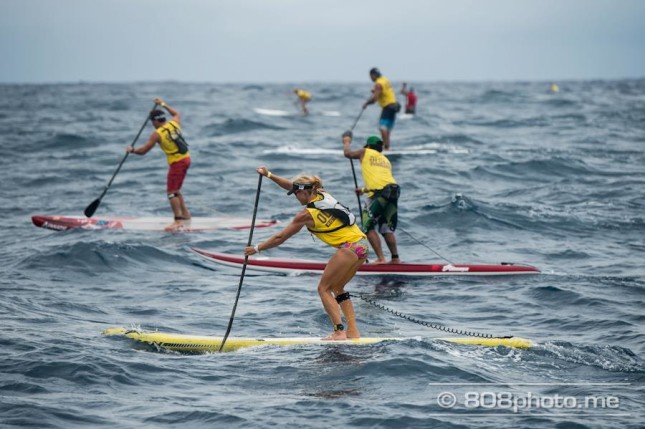
OluKai is one of the few examples of a major SUP race offering equal prize money (photo by www.808photo.me)
Narrowing the debate to “What’s best for the event” rather than what’s best for the paddlers allows for specific, quantifiable factors to influence the split. This way the prize money split becomes a tangible, business-based decision rather than an intangible, emotionally driven argument.
So while the paddlers have been driving this debate so far, I tend to think its really up to the person who controls the money to decide, which is usually the sponsor or the event organizer. It’s the golden rule: Whoever has the gold makes the rules.
If the organizer is the one who goes out and solicits sponsors, they need to be smart enough to know why that sponsor is giving them money and then reflect that in the event, so that the sponsor will be satisfied enough to invest again next year. Or on an even simpler level: The sponsor may simply dictate to the event director how they want their money (or “investment”) to be spent.
Paddlers look at races from a competitive angle, but the money behind major SUP races is coming from a business angle and that’s an entirely different thing altogether. When a sport reaches a certain level of professionalism, which SUP is clearly striving for, then at that point the sponsors don’t really care about competition, they just want a return on their investment.
You can’t just break this argument down and look at it from the competitor’s side; that’s not necessarily good for business. I think we, as paddlers, all need to step back and look at this from a business perspective, i.e. what’s best for the event. Racers need to acknowledge these business forces and realize that organizers are trying to ensure the event is an overall success.
Yes, in some cases that means attracting a high level of competition, which usually gets more attention for the event and in turn makes the sponsors happier. And right now if Danny, Conor, Kai and Travis show up to a race, that event is going to get a lot of media coverage, which means the sponsors are going to be happy. So the organizer has to ensure they put enough money on the line to ensure the biggest names are there. It doesn’t necessarily matter if they’re men or women, it’s about what’s best for the event. In some races it may be about attracting the top men, other races may be trying to attract the top women, while some races will be trying to attract both.
I understand why it would seem unfair to the women that they’re receiving less prize money than men, but again, I don’t think this is about men vs. women. I’ve never looked at this from a gender perspective, it’s about level of competition and, on an even more important level, what’s best for the event. In most cases (but certainly not all) I think you can quantifiably justify giving more money to the men, based not on gender but purely on the VALUE the top men bring to the event.
But again, not always. There are certain races where women are actually more valuable to the event, in which case they should be paid more. If women bring more value to any particular race, they should get paid more. And vice versa.
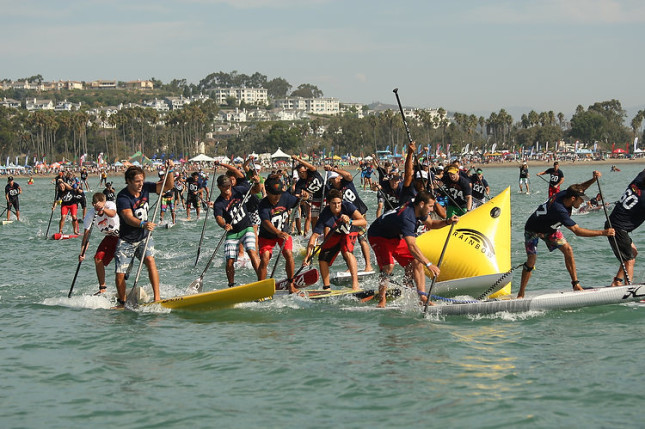
The Battle of the Paddle is the most famous example of more prize money going to men than women, and quite simply I believe that’s because the organisers and sponsors feel that’s what’s best for the event (photo by Rainbow Sandals)
It’s not about men vs. women for me, it’s about who’s bringing the most value so that the event is a success. And if Candice, Annabel and Jenny bring more value to an event than Danny, Travis, Connor and Kai, then they should get paid more.
I know this is a big issue and that the top competitors worry about it because it’s their livelihood, which is obviously vitally important, but we still have to take the big picture into account. So far the argument has largely been based on emotion, but you shouldn’t base business decisions on emotion.
I think everyone needs to take into account the bigger picture of having successful events. What suits the success of the event better? Because ultimately what grows the events grows the sport. If the sport gets bigger, there’s going to be more money in the industry and then more sponsorship dollars are available, which means more money for athletes in general, regardless of prize money splits.
It’s not about men. It’s not about women. It’s about what’s best for each event and what’s going to grow the sport into the future. And if equal prize money is what’s best for an event, then I’m all for it. But if it’s not, then I’m not.
Do men deserve more money just because they’re men? No, that’s ridiculous.
Do men deserve more money because they bring more media attention and value to the event? Potentially, but that’s not a certainty either.
If it’s about winning for the paddler, then forget about the prize money and just go out and win. And if it’s about the money for the paddler… well then you’re probably in the wrong sport. Really, if you got into this sport for the money, you better start looking somewhere else fast.
So that’s my basic point: it’s about what (or who) is going to provide the most value to ensure the event is a success.

Some races see mass participation and can therefore pay out prize money from entry fees, however even then it still comes down to the organiser’s philosophy about ‘what’s best for the event’
Now of course most of the above is based on the assumption that prize money is coming from sponsorship, but I realize there are a lot of middle-tier events where the prize money is actually coming from competitor registration fees. Hopefully as the sport grows it’ll become more and more about mainstream sponsors providing large prize purses rather than events getting by on the back of participation numbers, but I appreciate we’re not quite there yet.
But even when prize money comes from entry fees, in that case it still comes back to the overall success of the event, and so then the event organizer has to decide what is going to make the event most successful; more money for women, more for men, or even for both.
Or perhaps an organizer is putting on an event because they simply just want to put on a great event. In that case it’s entirely up to the personal philosophy of the individual organizer. If they want to put up a $15,000 purse and give a $10,000 bounty to the first guy alone, then they’d surely attract the likes of Travis, Danny, Connor, Kai and all the other top guys. And maybe that’s what they want, even if it’s at the expense of not attracting the top women.
On the flip side, if the organizer wants to attract the top women, they might put up a huge prize purse on the women’s side and have the likes of Candice, Annabel, Jenny, etc, competing, but they probably wouldn’t get any of the top guys.
But either way it’s entirely up to the person with the money to decide. Either the sponsor can tell the organizer what to do with the money they’re giving, or the organizer, as the one in charge of the success of the race, can split it how they think will best benefit the event.
Either way, for me it keeps coming back to what’s most important for the success of the event.
Should the women get the same amount as the men based purely on gender? No.
Should the men get more than women based purely on gender? No.
You’ve gotta take the men vs. women argument out of it entirely and simply look at the quantifiable factors most relevant to the success of the event.
That’s just my take on this whole debate anyway…
And again, let’s not forget this is only impacting about 20 people in the entire sport. For the 10,000 other people this is kind of irrelevant. Maybe we should just lock those 20 people in a room and let them hash it out while the rest of us go paddling. Then when they’re done, the rest of us will all just go paddling again, because it still won’t effect us…
– Dave



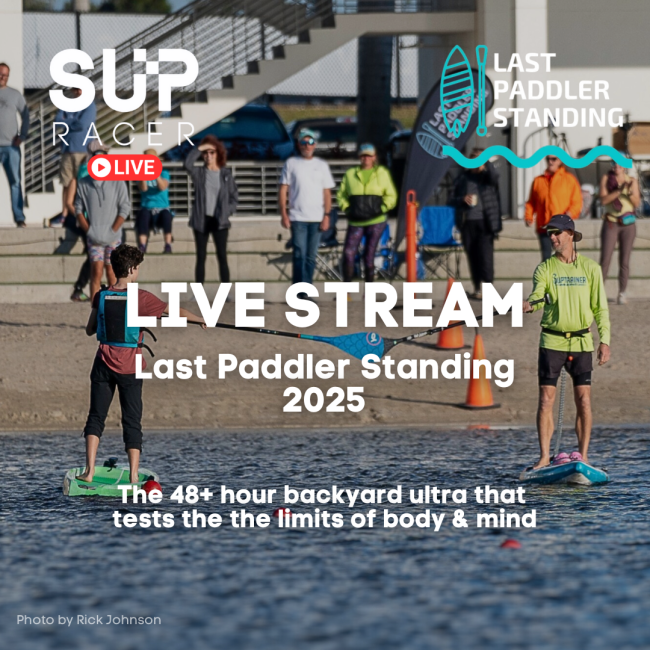
You must be logged in to post a comment.